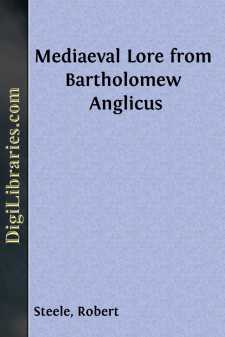Categories
- Antiques & Collectibles 13
- Architecture 36
- Art 48
- Bibles 22
- Biography & Autobiography 813
- Body, Mind & Spirit 142
- Business & Economics 28
- Children's Books 15
- Children's Fiction 12
- Computers 4
- Cooking 94
- Crafts & Hobbies 4
- Drama 346
- Education 46
- Family & Relationships 57
- Fiction 11828
- Games 19
- Gardening 17
- Health & Fitness 34
- History 1377
- House & Home 1
- Humor 147
- Juvenile Fiction 1873
- Juvenile Nonfiction 202
- Language Arts & Disciplines 88
- Law 16
- Literary Collections 686
- Literary Criticism 179
- Mathematics 13
- Medical 41
- Music 40
- Nature 179
- Non-Classifiable 1768
- Performing Arts 7
- Periodicals 1453
- Philosophy 64
- Photography 2
- Poetry 896
- Political Science 203
- Psychology 42
- Reference 154
- Religion 513
- Science 126
- Self-Help 84
- Social Science 81
- Sports & Recreation 34
- Study Aids 3
- Technology & Engineering 59
- Transportation 23
- Travel 463
- True Crime 29
Mediaeval Lore from Bartholomew Anglicus
by: Robert Steele
Description:
Excerpt
PREFACE
It is not long since the Middle Ages, of the literature of which this book gives us such curious examples, were supposed to be an unaccountable phenomenon accidentally thrust in betwixt the two periods of civilisation, the classical and the modern, and forming a period without growth or meaning—a period which began about the time of the decay of the Roman Empire, and ended suddenly, and more or less unaccountably, at the time of the Reformation. The society of this period was supposed to be lawless and chaotic; its ethics a mere conscious hypocrisy; its art gloomy and barbarous fanaticism only; its literature the formless jargon of savages; and as to its science, that side of human intelligence was supposed to be an invention of the time when the Middle Ages had been dead two hundred years.
The light which the researches of modern historians, archaeologists, bibliographers, and others, have let in on our view of the Middle Ages has dispersed the cloud of ignorance on this subject which was one of the natural defects of the qualities of the learned men and keen critics of the eighteenth and early part of the nineteenth centuries. The Middle-class or Whig theory of life is failing us in all branches of human intelligence. Ethics, Politics, Art, and Literature are more than beginning to be regarded from a wider point of view than that from which our fathers and grandfathers could see them.
For many years there has been a growing reaction against the dull "grey" narrowness of the eighteenth century, which looked on Europe during the last thousand years as but a riotous, hopeless, and stupid prison. It is true that it was on the side of Art alone that this enlightenment began, and that even on that side it progressed slowly enough at first—e.g. Sir Walter Scott feels himself obliged, as in the Antiquary, to apologize to pedantry for his instinctive love of Gothic architecture. And no less true is it that follies enough were mingled with the really useful and healthful birth of romanticism in Art and Literature. But at last the study of facts by men who were neither artistic nor sentimental came to the help of that first glimmer of instinct, and gradually something like a true insight into the life of the Middle Ages was gained; and we see that the world of Europe was no more running round in a circle then than now, but was developing, sometimes with stupendous speed, into something as different from itself as the age which succeeds this will be different from that wherein we live. The men of those times are no longer puzzles to us; we can understand their aspirations, and sympathise with their lives, while at the same time we have no wish (not to say hope) to put back the clock, and start from the position which they held. For, indeed, it is characteristic of the times in which we live, that whereas in the beginning of the romantic reaction, its supporters were for the most part mere laudatores temporis acti, at the present time those who take pleasure in studying the life of the Middle Ages are more commonly to be found in the ranks of those who are pledged to the forward movement of modern life; while those who are vainly striving to stem the progress of the world are as careless of the past as they are fearful of the future....


